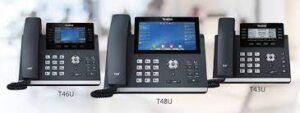How to Decide Between Cloud or Premise VoIP New Phone System?
What are the differences, when should you consider cloud over premise based VoIP new phone system, and when does it make financial sense to make the jump?
CSM, which has sold new phone systems in Tampa since 1984, is well versed in the world of telephony, both traditional and VoIP. Many, if not most, of our clients have gone ahead and made the leap to cloud based telephone systems. However, we constantly have customers wanting to know more about VoIP, how it might help their business, what the advantages over a traditional premise based system are, and why or when they should make that jump. The answers are, unfortunately, rather tailored to each individual firm or organization. However, there are some general ideas that can be expounded upon to help our clients.
 To begin with, a company needs to take a thorough look at what their communication system is doing today, how it operates, and how the users interact with it. Here are a few thoughts to start that process:
To begin with, a company needs to take a thorough look at what their communication system is doing today, how it operates, and how the users interact with it. Here are a few thoughts to start that process:
- What are the “must have” features that your employees are using? Be careful here! These features often vary by user or role within the organization.
- How many telephones are basic ( IE: break room), standard (typical employees), expanded user (IE: executive assistant or reception), dispersed users such as home workers or Road Warriors, and then how many conference phones are there?
- What is the line service? CO, T-1/ PRI, SIP? Maybe a mix of these even.
- What is the onsite infrastructure like? Is the cable plant up to date? VoIP telephones use data cables and not traditional voice cables.
- Are there remote sites that are or should be connected?
- How old is the telephone system? Is it still supported by the manufacturer?
- The average lifespan of a telephone system is 7-9 years, so if yours is older than this, it is highly likely that it is unsupported.
- Is the manufacturer still in business?
- Many telephone system manufacturers have gone out of business or were absorbed by other companies over the last 15 years including such heavyweights as Nortel (Avaya), Comdial (out of business), Vodavi (out of business), Siemens (Unify), Toshiba (Mitel), and ShoreTel (Mitel).
After determining the answers to the questions above, it would then be helpful to have a better understanding of what the differences between cloud and premise based phone systems are; after that the business will be in a position to decide which is best suites them.
At the most basic level, the operational differences of a cloud as opposed to a premise based system are generally very minimal. Both provide a desk phone with a range of features and functions from basic to advanced. Some cloud systems are, however, less feature rich and provide an experience that is best suited for organizations only requiring the fundamental five features- In/ Out Calling, Hold, Transfer, Conference, and Redial. Most premise based systems today contain the wealth of features developed over the last 20 years, often referred to as “key” system functions, including Call Pickup, Park, Call Forwarding, Voice Mail, etc. When comparing features, try and determine or obtain a feature list- most manufacturers easily have this available. This feature list should be at least the basis for where to begin to narrow down the providers or manufacturers of the cloud or premise based VoIP. Here is where cloud can really start to shine. Many of our clients have been interested in advanced features such as call recording, call center (true call centers with reporting, etc. Not just distributing calls which is UCD, a common basic feature), and remote phones at satellite offices. With cloud, an organization can deploy these sort of features on a per user basis for only a few more dollars than a standard user. This removes the often exceedingly high cost of purchasing a hardware and software package as in the past.
 Finally, a budget must be determined. Typically, a cloud system is a monthly subscription contract per user or “seat” which includes telephone service, telephones, and support. Prices generally range from $15 for a basic user to $30 for a call center agent. While this may seem expensive at first, recall that it includes service, support, and the hardware. As an example, an average 30 telephone system in the cloud would be roughly $600 per month
Finally, a budget must be determined. Typically, a cloud system is a monthly subscription contract per user or “seat” which includes telephone service, telephones, and support. Prices generally range from $15 for a basic user to $30 for a call center agent. While this may seem expensive at first, recall that it includes service, support, and the hardware. As an example, an average 30 telephone system in the cloud would be roughly $600 per month
($22 x 30 phones). For a premise based phone system, we can assume it would be about $8,000 cash purchase, plus the recurring yearly support of around $800, along with the line service which on a standard T-1 or PRI would be about $450 per month. Broken down on a monthly basis, that would be $133 for hardware ($8,000/ 60 months), $67 for support ($800/12), and $450 for line service, totaling $650 per month, or $50 more than the cloud system.
Final thoughts- in order to determine whether your company should go cloud or premise, we must take into account the physical infrastructure, user functionality, and costs. Along with some diligent work from organizations such as CSM, you can be sure that you will make a wise choice for your telecommunications system and be able to enjoy many years of quiet enjoyment.
CSM South installs new VoIP and traditional telephone systems in Tampa, Mobile, Austin, Jacksonville and all over the southeast US. Give us a call! 800-226-3389
